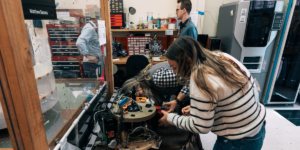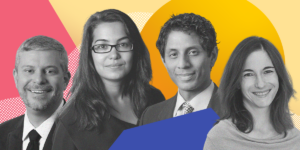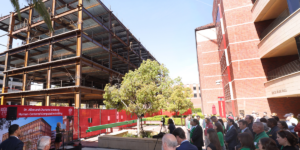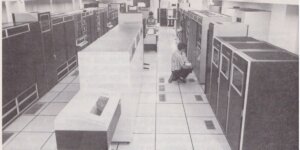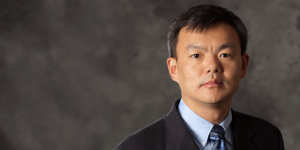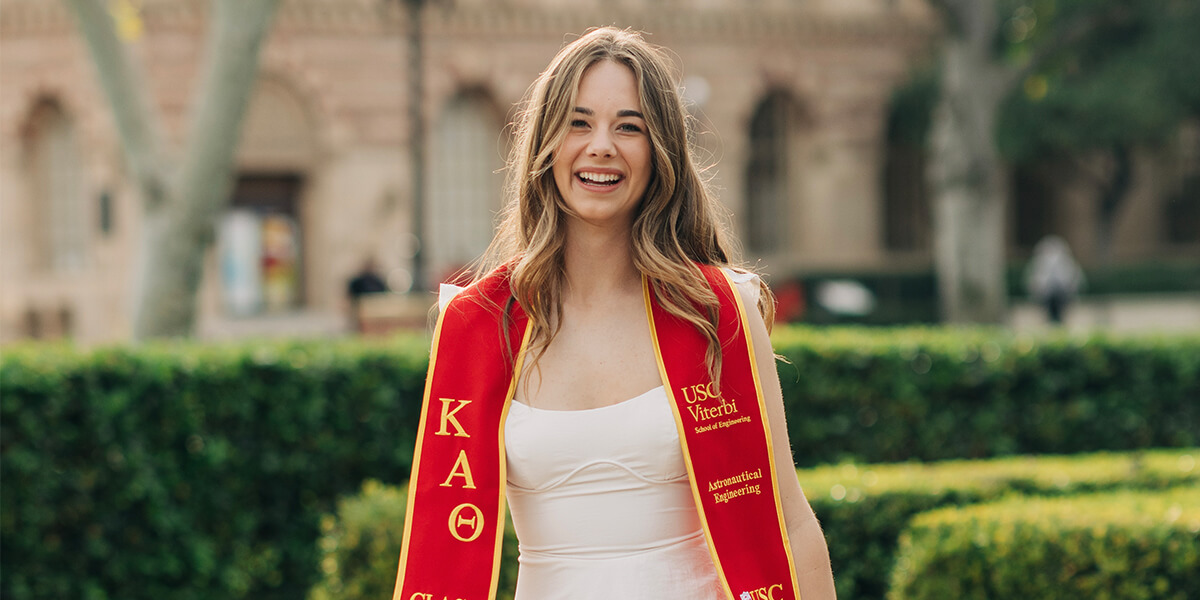
Brooke Rios celebrates her graduation on the USC campus
Brooke Rios always had her sights set on the cosmos. As a USC graduate in astronautical engineering, Brooke Rios has excelled academically and immersed herself in hands-on technical projects.
While Rios has achieved impressive accomplishments – including prestigious scholarships, Dean’s List honors and leadership roles – she credits her success to the mentors who have propelled her forward. With the academic support of her professors and the generously shared expertise of industry leaders, Rios has cultivated a network of support that extends far beyond the classroom.
It’s a testament to the transformative potential of mentorship – and a blueprint for any student seeking to soar.
You’ve earned several prestigious scholarships and distinctions during your time at USC. How has financial support enabled you to make the most of your education?
I hold my scholarships, very near and dear to my heart – they enable me to attend USC and to thrive here. In addition to various grants, I have a Presidential Scholarship and I’m a Viterbi Fellow which guarantees me research funding as well as a stipend every semester.
What do you count among your primary academic successes?
Last semester I had the chance to collaborate with three friends on my senior project for the USC Department of Aerospace & Mechanical Engineering. We designed a 4-reaction wheel system for a CubeSat, a very small artificial satellite that’s a low-cost alternative to a traditional satellite. It’s a self-actuating system, which means the satellite can independently maneuver itself without relying on ground commands.
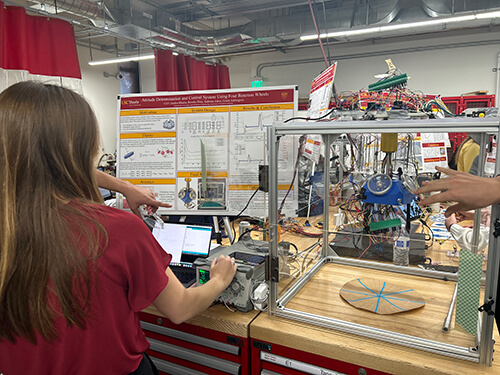
Brooke Rios in the lab, designing a CubeSat system for her senior project
I was responsible for writing the control system piece, which was a challenge because I had never taken a controls class before! It was such a hands-on project. We built the hardware ourselves and had to design the test stand with three degrees of freedom, which was challenging. I was trying something new while also applying knowledge from other classes. My teammates were fantastic and the professors were extremely supportive – especially Senior Lecturer Inna Abramova. Although I wasn’t in her controls class, she invited me to attend her lectures and office hours.
In addition to your senior project, you were also involved with the MAVERIC CubeSat through the USC Space Engineering Research Center (SERC). How has that project shaped your engineering education and career preparation?
It was a rare opportunity to collaborate with students and Professor Dave Barnhart on developing the satellite telecommunications system. The main goal of MAVERIC is to study how magnets behave in orbit and to test different technology payloads for visualization on LCD screens. The best part of the project is that MAVERIC is actually scheduled to launch into orbit in November 2025! Creating an object that will soon be in space was an incredible experience, making all the hard work feel worthwhile.
How has mentorship and guidance from various industry professionals helped shape your educational and career journey?
Dan Rowan, a USC alum who works at NASA, was my sophomore-year mentor through the USC JumpStart program which provides a pathway to PhD programs for undergraduate students. We met bi-weekly for an entire year. He provided exceptional advice on internships and connected me with industry contacts with whom I’m still in contact. He came to see my senior project last fall, and overall has been an invaluable guide.
I’m also grateful to Dan for introducing me to another of my mentors, Tim Cole. After 20 years at the space technology company Maxar, Tim now leads program management at the startup Astro Digital, where I interned last summer. We’ve kept in touch continually, talking monthly for the past two years – his knowledge has been especially helpful as I weigh up the merits of different job offers. I am truly grateful for his continued guidance and look forward to staying connected after graduation.
Dan also introduced me to Vanessa Kuroda, who has worked at Blue Origin among other companies. Now she’s at Outpost, a startup based in Santa Monica. She set up the Women in Aerospace Mentor Circle who meet via zoom. I have the chance to meet with the group regularly, and I’ve learned so much from networking in the field.
What’s your next step after graduating?
I’m extremely excited to be joining McMaster-Carr in Chicago as a full-time software engineer starting in June. I first connected with them at the SWE conference, as I’d been using their CAD files for some of my Mechoptronics projects.
While software engineering is a new frontier for me, I feel well-equipped thanks to the problem-solving mindset I developed at Viterbi. I’m eager to dive in and expand my skill set. In the long run, I’d love to leverage my engineering background to start my own company focused on using technology for the greater good.
Published on May 8th, 2024
Last updated on May 8th, 2024




